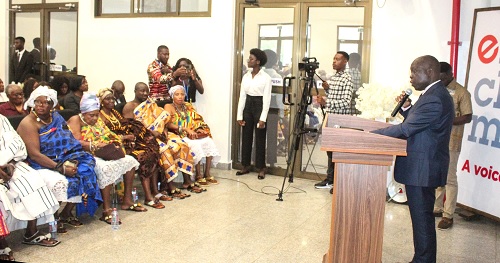
Help end negative cultural practices - Traditional authorities urged
The UNFPA Resident Representative to Ghana, Dr Wilfred Ochan, has called for a collaborative engagement with traditional authorities in order to help end cultural practices and norms that do not promote development but affect the human rights of others.
He explained that as custodians of culture and mediators of conflicts, traditional authorities, including chiefs and queenmothers, served as pivotal intermediaries for development and wielded significant power, which empowered them to review any cultural practice, including child marriage that affected their people and did not promote development.
"Traditional leaders can leverage their cultural authority and community standing to significantly advance women's rights, gender equality and empowerment, and create more inclusive societies.
They can conduct advocacy and awareness creation through community dialogues; influence policies to address the concerns; support women initiatives; challenge harmful practices; promote education and training of girls and become role models in treating women with respect and fairness," he said.
Dr Ochan said this in Accra last Friday, at a stakeholder engagement seminar on Ghanaian culture and the quest for women and children's rights.
The seminar, organised by the University of Professional Studies Otumfuo Centre for Traditional Leadership (OCTL) in partnership with the UNFPA, was focused on finding the symmetry, as well as the divergence between culture, women and children's rights.
Cultural practices
Dr Ochan, using the stories of two countries where certain cultural practices were prevalent but one was able to end because it involved traditional authorities, said together, solutions could be found even in harmful practices that were deeply rooted in culture and norms.
He pointed out that gender equality required a partnership between women and men, between government and the private sector, academia, development partners, faith-based organisations and most importantly traditional authorities.
Throwing more light on the role of traditional authorities in the empowerment of women and girls, he said effective programmes recognised that gender roles and relations were intertwined with cultural, religious, economic, political and social circumstances.
"They are based on the idea that gender relations or culture are not static and can be changed. Getting to the root of the problem is very critical in finding solutions and it is for this reason that UNFPA has been working with traditional leaders over the years to find solutions to some of the pressing challenges," he stated.
On the UPSA partnership, he said it was to ensure that their training curriculum mainstreamed issues of gender, human rights, and inclusion and reach out to their students who were traditional leaders and stakeholders in the traditional arena to co-create solutions that were rights-based and that uplifted their communities.
Child marriage
During a panel discussion on ending child marriage in Ghana, the panellists made up of traditional rulers, a lawyer, a student and the Chief Director of the Ministry of Gender, Children and Social Protection, Dr Afisah Zakariah, said the only way to end child marriage in the country was to continue engaging traditional rulers.
Dr Zakariah in a submission added that Ghana had been a champion of various initiatives and that ending child marriage would not be a surprise.
She said child marriage was considered a violation of the rights of the child and was also seen as a form of domestic violence, adding that as a ministry, they would do everything to protect the Ghanaian child.
A Board Member of FIDA, Kezia Peace Kenneth, a panellist, said traditional authorities could help end child marriage by pointing out its consequences to members of their communities.
The Dean of the Faculty of IT and Communication Studies, Professor Emmanuel Selase Asamoah, said the university recognised the unique role that the chieftaincy institution played in the development of the nation and would do everything possible to reinforce its place in the development of the country.
